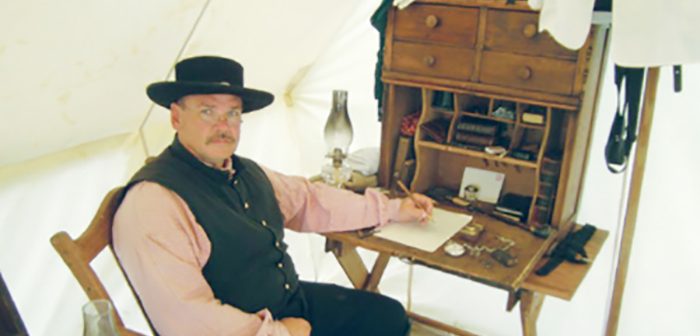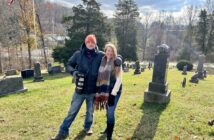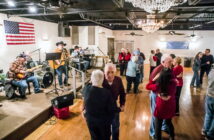Civil War Historical Impressions Keeps the Spirit of Gettysburg’s Past Alive
Story and photography by John Christopher Fine
Few events in history have provoked more contemporary interest, emotion, and passion than the American Civil War.
The Civil War and its momentous battles have been studied and debated, analyzed and dissected. What was once a brutal, cruel, and violent battle is sometimes viewed through the filter of time as romantic, gracious, and gallant. Southerners are portrayed in film as dashing cavalry officers dressed in radiant uniforms. Confederate combatants are portrayed in fiction and portraiture attending lavish balls and cotillions, defending their cause advocating for state’s rights. Union heroes are ironclad seamen fighting with new technology that revolutionized warfare at sea.
For years, historians with a knack for acting have portrayed protagonists of the past in this War Between the States. Some favor the South, some the North, while others take on civilian personalities or humble soldiers. Some assume roles of grandiose leaders like Abraham Lincoln and Jefferson Davis. Some are doctors, some embalmers, and some photographers offering tintypes of reenactors in their regalia. Women in period gowns accompany their escorts dressed as generals and admirals to Victorian-era dances.
Harry Sonntag is one such individual inspired by the past. He founded Civil War Historical Impressions (CWHI) to teach history through real personalities of the period. “Our organization is about education and preservation,” he says. “We do not expect anything in return. It is all out of our own pockets. My satisfaction comes seeing my daughter, who ran around Civil War battlefields with me when she was 2 years old, now a student at Gettysburg College with a double major in Civil War studies and museum curation and a minor in history.”
Sonntag founded CWHI in late 2014 with just two members. Today, the organization has more than 400 members, both male and female, blue and gray. Sonntag says the organization’s purpose is simple, yet powerful: “Educate the public honestly and fairly; to honor people that endured hardships in the field and at home during the Civil War.”
“It’s Important to Preserve Our History”
Imagine members of CWHI encamped in period tents in a copse of trees at Gettysburg’s Artillery Ridge Campgrounds. Just across the street from Artillery Ridge, the National Park Service preserves the battlefield that saw 51,000 casualties over three days of fighting on July 1-3, 1863.
Sonntag portrays Dr. Hunter Holmes McGuire, the medical director of the Confederate Army’s Second Corps and personal friend and physician to Stonewall Jackson. It may seem a stretch for the 50-year-old, Philadelphia born, Penn State University business graduate to assume the role of a southern doctor. But, “after college I went into emergency medical service,” Sonntag says. “I worked for American Medical Response as a regional vice president. So, I have a strong background in the medical field.”
Sonntag became interested in the Civil War as a young boy. He began reenacting as a hobby, first as an infantryman then learned the ways of an officer. For the last eight years, he’s been a living historian portraying Dr. McGuire.
CWHI’s Vice President Carol Polkinghorne joins him. Dressed in a magnificent hooped gown, Polkinghorne leads discussions under a period tent. Spectators from Artillery Ridge Campground and the general public sit on hay bales as Polkinghorne portrays a southern woman working with the Dixie Rose Relief Society.
“I was always interested in Revolutionary War and Civil War history,” says Polkinghorne, who was born in Washington, D.C., and raised in Northern Virginia. “I was a single mom with two boys. I brought the boys here to Gettysburg. I thought they would be interested in the history surrounding the momentous battle fought here. We toured Gettysburg battlefield then attended a reenactment. The southern charge began with a Rebel Yell. I said to friends at the time that I felt that this is where I belong.”
Now, sitting on a camp chair under a period campaign tent, Polkinghorne’s green eyes flare with emotion. “Hearing the speeches in the activities tent just now, I got weepy eyed,” she says. “It can be a very emotional experience listening to portrayals that describe hardships of the war.”
Polkinghorne’s hobby began with a recommendation from a friend to buy a period dress. Now, quite a few dresses later, she’s hooked. “As a single woman there was not much I could do,” she says of her early reenacting days. “Many wives come with their husbands to reenactments, but there were few roles for single women. With a friend, Janet Arone, I formed the Dixie Rose Relief Society. We would show what women were doing while the men were off to war. Then, we met Sonntag and joined this group.”
She’s proud that young girls less interested in the marching and “left flank, right flank” of warfare can see a picture of what it would have been like for them during the Civil War.
“They would have worked in munitions factories,” she says. “They would have carried messages across the lines. We draw the public in. They can see and appreciate important roles women played during the war. They can see how passionate women were doing everything they could to support the effort. We buy bolts of muslin and let young people tear and wrap bandages. Some like to get bandaged up. We bought fans for girls that attended. We purchase this stuff ourselves to reach out and teach the public and leave an impression on them, to spark interest in our history.”
“It is important to preserve our history and honor those from the time, both soldiers and civilians,” Polkinghorne adds. “It becomes a passion. I feel the emotion. We bring roses to every event. After the event we go to cemeteries or battlefields or monuments and place the roses in honor of the dead.”
“We Cannot Let Our History Go”
“In order to portray individuals properly and effectively we need to know them,” Sonntag says, “their personalities, their background.”
Sonntag knew he wanted to do something with his medical background, so he chose to portray Dr. McGuire. “There was no greater figure than Dr. McGuire,” he says. “During the war he was a proponent of equal care for both sides. Surgeons were noncombatants. Dr. McGuire petitioned both Jefferson Davis and President Abraham Lincoln to adopt a policy that surgeons were noncombatants and would not be held as prisoners of war. In field hospitals, doctors would care for blue and gray. McGuire succeeded in getting the resolution adopted in 1863 by both governments.”
After the war, Dr. McGuire founded St. Luke’s Hospital in Richmond, a medical school, and two nursing schools. He later became president of the American Medical Association and the American Surgical Association. “He was the first doctor to perform a successful abdominal aortic aneurism operation and the first successful hysterectomy,” Sonntag says. “He came from a family of surgeons.
His father, Dr. Hugh McGuire, was an eye surgeon
that served under his son during the war.”
Harry’s enthusiasm and knowledge of history shines as he describes the events that led to his current role with CWHI. “We cannot let our history go,” he says. “It needs to be preserved and remembered. We need to learn from our history, good and bad. We must bring positive and negative events to light so we don’t forget.”
In addition to reenactments, Sonntag and CWHI also preserve historical landmarks, and they’ve restored and replaced cemetery tombstones. The organization expects to be granted 501(c) 3 nonprofit status soon, helping to further their cause of teaching America’s history through first-person impressions, living history demonstrations, and battlefield reenactments.
“The last thing my mother told me before she died was, ‘Harry it is not about you. It’s about helping others.’ Here I am,” Harry says, feeling the emotion imbued by his mother’s advice.





3 Comments
https://biaconnect.net/amknowener gilbuza larkin c94ff34b83
https://choicesgh.com/viopotnaro zebuelois lamont 4b1f4b8a67
http://holz-ideen.at/gästebuch/ quaagoann franchesca 6b11cea230